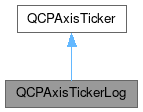QCPAxisTickerLog

Public Member Functions | |
| QCPAxisTickerLog () | |
| double | logBase () const |
| void | setLogBase (double base) |
| void | setSubTickCount (int subTicks) |
| int | subTickCount () const |
 Public Member Functions inherited from QCPAxisTicker Public Member Functions inherited from QCPAxisTicker | |
| QCPAxisTicker () | |
| virtual void | generate (const QCPRange &range, const QLocale &locale, QChar formatChar, int precision, QVector< double > &ticks, QVector< double > *subTicks, QVector< QString > *tickLabels) |
| void | setTickCount (int count) |
| void | setTickOrigin (double origin) |
| void | setTickStepStrategy (TickStepStrategy strategy) |
| int | tickCount () const |
| double | tickOrigin () const |
| TickStepStrategy | tickStepStrategy () const |
Protected Member Functions | |
| virtual QVector< double > | createTickVector (double tickStep, const QCPRange &range) override |
| virtual int | getSubTickCount (double tickStep) override |
 Protected Member Functions inherited from QCPAxisTicker Protected Member Functions inherited from QCPAxisTicker | |
| double | cleanMantissa (double input) const |
| virtual QVector< QString > | createLabelVector (const QVector< double > &ticks, const QLocale &locale, QChar formatChar, int precision) |
| virtual QVector< double > | createSubTickVector (int subTickCount, const QVector< double > &ticks) |
| double | getMantissa (double input, double *magnitude=nullptr) const |
| virtual QString | getTickLabel (double tick, const QLocale &locale, QChar formatChar, int precision) |
| virtual double | getTickStep (const QCPRange &range) |
| double | pickClosest (double target, const QVector< double > &candidates) const |
| void | trimTicks (const QCPRange &range, QVector< double > &ticks, bool keepOneOutlier) const |
Protected Attributes | |
| double | mLogBase |
| double | mLogBaseLnInv |
| int | mSubTickCount |
 Protected Attributes inherited from QCPAxisTicker Protected Attributes inherited from QCPAxisTicker | |
| int | mTickCount |
| double | mTickOrigin |
| TickStepStrategy | mTickStepStrategy |
Additional Inherited Members | |
 Public Types inherited from QCPAxisTicker Public Types inherited from QCPAxisTicker | |
| enum | TickStepStrategy { tssReadability , tssMeetTickCount } |
Detailed Description
Specialized axis ticker suited for logarithmic axes.

This QCPAxisTicker subclass generates ticks with unequal tick intervals suited for logarithmic axis scales. The ticks are placed at powers of the specified log base (setLogBase).
Especially in the case of a log base equal to 10 (the default), it might be desirable to have tick labels in the form of powers of ten without mantissa display. To achieve this, set the number precision (QCPAxis::setNumberPrecision) to zero and the number format (QCPAxis::setNumberFormat) to scientific (exponential) display with beautifully typeset decimal powers, so a format string of "eb". This will result in the following axis tick labels:

The ticker can be created and assigned to an axis like this:
Note that the nature of logarithmic ticks imply that there exists a smallest possible tick step, corresponding to one multiplication by the log base. If the user zooms in further than that, no new ticks would appear, leading to very sparse or even no axis ticks on the axis. To prevent this situation, this ticker falls back to regular tick generation if the axis range would be covered by too few logarithmically placed ticks.
Definition at line 2037 of file qcustomplot.h.
Constructor & Destructor Documentation
◆ QCPAxisTickerLog()
| QCPAxisTickerLog::QCPAxisTickerLog | ( | ) |
Constructs the ticker and sets reasonable default values. Axis tickers are commonly created managed by a QSharedPointer, which then can be passed to QCPAxis::setTicker.
Definition at line 7730 of file qcustomplot.cpp.
Member Function Documentation
◆ createTickVector()
|
overrideprotectedvirtual |
Creates ticks with a spacing given by the logarithm base and an increasing integer power in the provided range. The step in which the power increases tick by tick is chosen in order to keep the total number of ticks as close as possible to the tick count (setTickCount).
The parameter tickStep is ignored for the normal logarithmic ticker generation. Only when zoomed in very far such that not enough logarithmically placed ticks would be visible, this function falls back to the regular QCPAxisTicker::createTickVector, which then uses tickStep.
\seebaseclassmethod
Reimplemented from QCPAxisTicker.
Definition at line 7794 of file qcustomplot.cpp.
◆ getSubTickCount()
|
overrideprotectedvirtual |
Returns the sub tick count specified in setSubTickCount. For QCPAxisTickerLog, there is no automatic sub tick count calculation necessary.
\seebaseclassmethod
Reimplemented from QCPAxisTicker.
Definition at line 7776 of file qcustomplot.cpp.
◆ logBase()
|
inline |
Definition at line 2043 of file qcustomplot.h.
◆ setLogBase()
| void QCPAxisTickerLog::setLogBase | ( | double | base | ) |
Sets the logarithm base used for tick coordinate generation. The ticks will be placed at integer powers of base.
Definition at line 7741 of file qcustomplot.cpp.
◆ setSubTickCount()
| void QCPAxisTickerLog::setSubTickCount | ( | int | subTicks | ) |
Sets the number of sub ticks in a tick interval. Within each interval, the sub ticks are spaced linearly to provide a better visual guide, so the sub tick density increases toward the higher tick.
Note that subTicks is the number of sub ticks (not sub intervals) in one tick interval. So in the case of logarithm base 10 an intuitive sub tick spacing would be achieved with eight sub ticks (the default). This means e.g. between the ticks 10 and 100 there will be eight ticks, namely at 20, 30, 40, 50, 60, 70, 80 and 90.
Definition at line 7761 of file qcustomplot.cpp.
◆ subTickCount()
|
inline |
Definition at line 2044 of file qcustomplot.h.
Member Data Documentation
◆ mLogBase
|
protected |
Definition at line 2052 of file qcustomplot.h.
◆ mLogBaseLnInv
|
protected |
Definition at line 2056 of file qcustomplot.h.
◆ mSubTickCount
|
protected |
Definition at line 2053 of file qcustomplot.h.
The documentation for this class was generated from the following files:
Documentation copyright © 1996-2025 The KDE developers.
Generated on Fri May 2 2025 12:02:40 by doxygen 1.13.2 written by Dimitri van Heesch, © 1997-2006
KDE's Doxygen guidelines are available online.